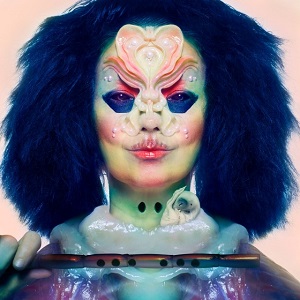Album Review: Björk – Utopia
3 min read
With a duration of nearly seventy-two minutes, Björk’s Utopia stands as her longest studio album yet. And, if the Icelandic singer’s ninth album seems somewhat abstruse and self-indulgent, that’s because it is. That’s not a criticism per se but a statement of fact. After all fans and detractors alike would be immensely, and vocally, disappointed should the reigning queen of art-pop drop a record that is easily grasped by the listener or that offered commercial appeal.
 Layers of mellow electropop and airy vocals open Utopia with Arisen My Senses offering a satisfying five-minute introduction to the album, before moving on the dreamy harp of Blissing Me – the record’s second single. For any other pop-oriented artist, offering up a track without a well-defined chorus would be unthinkable, yet Björk goes one better with electronic beats that are slightly mismatched to the song that surrounds them following on from the solo, illustrating her propensity towards the unusual. Unlike Blissing Me, lead single The Gate features a clear chorus – albeit a starkly minimal one – and interesting vocal trills and tongue-rolls throughout, although by the six-minute mark the song is starting to feel overly long.
Layers of mellow electropop and airy vocals open Utopia with Arisen My Senses offering a satisfying five-minute introduction to the album, before moving on the dreamy harp of Blissing Me – the record’s second single. For any other pop-oriented artist, offering up a track without a well-defined chorus would be unthinkable, yet Björk goes one better with electronic beats that are slightly mismatched to the song that surrounds them following on from the solo, illustrating her propensity towards the unusual. Unlike Blissing Me, lead single The Gate features a clear chorus – albeit a starkly minimal one – and interesting vocal trills and tongue-rolls throughout, although by the six-minute mark the song is starting to feel overly long.
Where strings shaped the sound of 2015’s Vulnicura, flutes dominate Utopia, as attested to by the title track and the counterpointed melodies of Courtship. Body Memory is clearly meant as the set piece for the album, running to nearly ten-minutes and smoothly segueing into the near five-minutes of Features Creatures. Being the apparent focal point for the album, it is fitting that Body Memory should impress itself upon the listener as Utopia in miniature, being both interminably long and briskly paced with its simultaneously lucid and abstract lyrics of passion and sexuality.
With the exception of the elastic beats of Courtship and, to a lesser extent, Losss, Utopia’s mid-section could safely be excised from the record in the name of consistency and the enjoyment of the listener, as by the time the musical interlude Paradisia and Saint – a paean to the power of music – roll around fatigue is setting in. Björk’s vocals are as strong as ever throughout, although broken English and odd inflections on Features Creatures add to that song’s unpleasant shambolic atmosphere.
Over the twenty-five years of her solo career, Björk has often been viewed as an innovative and experimental artist, with a sound and a style that defies categorisation. While this has certainly been true to varying extents over the years, a sense of easy recognition permeates Utopia, thanks to musical and lyrical motifs repeated from earlier releases, and this familiarity would seem to indicate that Björk’s work is more firmly rooted in the ideas of representation, presentation, and re-presentation – in repetition and variation – than in outright novelty. While Utopia is certainly a flawed release, Björk has executed it with such confidence that it is difficult not to become at least a little enthralled by the album’s overall effect and its place in her oeuvre.



